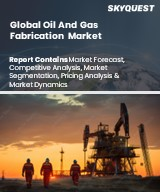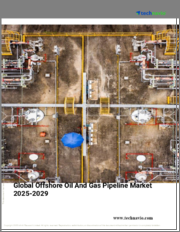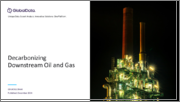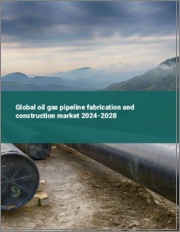
|
시장보고서
상품코드
1795293
석유 및 가스 파이프라인 제조와 건설 시장Oil Gas Pipeline Fabrication and Construction |
||||||
석유 및 가스 파이프라인 제조와 건설 세계 시장은 2030년까지 6,223억 달러에 달할 전망
2024년에 2,783억 달러로 추정되는 석유 및 가스 파이프라인 제조와 건설 세계 시장은 2024년부터 2030년까지 CAGR 14.4%로 성장하여 2030년에는 6,223억 달러에 달할 것으로 예측됩니다. 이 보고서에서 분석한 부문 중 하나인 석유 최종 용도는 CAGR 12.4%를 기록하며 분석 기간 종료시에는 3,778억 달러에 달할 것으로 예상됩니다. 가스 최종 용도 부문의 성장률은 분석 기간 동안 CAGR 17.9%로 추정됩니다.
미국 시장은 732억 달러로 추정, 중국은 CAGR 13.6%로 성장 예측
미국의 석유 및 가스 파이프라인 제조와 건설 시장은 2024년에 732억 달러로 추정됩니다. 세계 2위 경제 대국인 중국은 2030년까지 970억 달러의 시장 규모에 달할 것으로 예측되며, 분석 기간인 2024-2030년 CAGR은 13.6%를 기록할 것으로 예상됩니다. 기타 주목할 만한 지역별 시장으로는 일본과 캐나다가 있고, 분석 기간 동안 CAGR은 각각 12.9%와 12.6%로 예측됩니다. 유럽에서는 독일이 CAGR 10.7%로 성장할 것으로 예측됩니다.
석유 및 가스 파이프라인 제작과 건설 세계 시장 - 주요 동향과 촉진요인 정리
파이프라인 가공 및 건설이 석유 및 가스 가치사슬에서 중요한 이유는 무엇인가?
파이프라인 제조 및 건설은 석유 및 가스 인프라 개발의 핵심 분야로, 원유, 천연가스 및 정제품의 안전하고 효율적인 장거리 수송을 가능하게 합니다. 이 프로세스에는 세부 엔지니어링, 재료 조달, 용접, 굽힘 가공, 코팅, 접합 테스트, 도랑 파기, 다양한 지형에서의 설치가 포함됩니다. 파이프라인은 생산지와 정제소, 저장 터미널, 최종사용자 시장을 연결하는 것으로, 지속적인 흐름과 유통에 필수적인 역할을 합니다.
제작에는 조립식 파이프 스풀, 모듈식 부문, 밸브 스테이션, 계량 시스템, 압축기 및 펌프 스테이션 등이 포함됩니다. 건설을 위해서는 환경 문제, 규제 요건, 토지 접근 문제, 안전 기준을 극복하기 위한 탄탄한 계획이 필요합니다. 사막, 산악지대, 해저, 영구 동토 지역 등 외딴 지역과 어려운 지형에서 생산이 확대됨에 따라 첨단 파이프라인 제조 및 현장 건설의 역할은 점점 더 복잡해지고 있으며, 운영 기한을 준수하는 데 필수적인 요소가 되었습니다.
기술과 표준은 파이프라인의 엔지니어링과 시공을 어떻게 변화시키고 있는가?
기술의 발전은 파이프라인 제조 및 건설의 효율성, 안전성, 정확성을 크게 향상시켰습니다. 내식성과 강도 대 중량비를 향상시킨 고급강을 사용함으로써 안전성을 해치지 않으면서도 두께를 얇게 하고 스팬을 길게 할 수 있게 되었습니다. 일관된 용접 품질을 보장하고 인적 오류를 줄이고 엄격한 검사 기준을 충족시키기 위해 현재 자동 및 반자동 용접 시스템이 널리 사용되고 있습니다. 엑스레이 검사, 초음파 검사 등 비파괴 검사(NDT) 기법은 실시간 품질 검증을 위해 워크플로우에 통합되어 있습니다.
지리정보시스템(GIS), 빌딩 정보 모델링(BIM), 프로젝트 관리 플랫폼과 같은 디지털 도구는 경로 최적화, 시공 순서 결정, 위험 감소를 향상시키고 있습니다. 수평 방향 굴착(HDD)과 같은 트렌치리스 기술은 하천 횡단, 도시 지역, 생태적으로 민감한 지역에서 채택되고 있습니다. 내마모성, 내화학성, 내자외선성을 강화한 코팅 시스템은 수명을 연장하고 유지보수의 필요성을 줄이기 위해 가공 야드에서 적용되고 있습니다. ASME, API, ISO 표준을 포함한 세계 건설 표준 준수, 특히 국경을 넘는 파이프라인과 해저 파이프라인의 품질을 강화하고 있습니다.
전 세계 파이프라인 건설 동향에 영향을 미치는 배치 동향은?
북미, 중동, 중앙아시아, 아프리카 등 지역에 걸친 대규모 석유 및 가스 수송 프로젝트가 세계 파이프라인 건설 트렌드를 형성하고 있습니다. 북미에서는 셰일가스 생산량 확대로 인해 원유, 천연가스, NGL을 위한 유역 내 및 지역 간 파이프라인 건설이 촉진되고 있습니다. 중동에서는 각국의 석유회사들이 정유소 통합, 수출 터미널 접근, 지역 가스 무역을 지원하기 위해 파이프라인 회랑에 투자하고 있습니다. 아프리카에서는 새로운 오프쇼어 프로젝트와 국경을 초월한 수출 기회와 연계된 파이프라인 개발을 볼 수 있습니다.
육상 파이프라인 네트워크가 여전히 압도적이지만, 브라질, 멕시코만, 서아프리카의 심해 생산을 지원하기 위해 해상 파이프라인 건설이 확대되고 있습니다. 해저 파이프라인의 제조는 환경 조건에 따라 더 높은 정밀도와 고강도 재료가 요구됩니다. 또한, 지정학적 요인과 에너지 다변화 목표가 유럽과 아시아를 가로지르는 대륙 횡단 가스 파이프라인에 대한 투자를 촉진하고 있습니다. 수소, CO2 수송, 암모니아 파이프라인에 대한 관심이 높아지면서 대체 연료와의 호환성 및 부식 감소에 초점을 맞춘 새로운 제조 요구사항이 도입되고 있습니다.
파이프라인 제조 및 건설 시장의 성장을 촉진하는 요인은 무엇일까?
석유 및 가스 파이프라인 제조와 건설 시장의 성장은 몇 가지 요인에 의해 이루어집니다. 천연가스 및 원유에 대한 세계 수요 증가는 장거리 송전 인프라 개발에 박차를 가하고 있습니다. LNG 시설 및 관련 피더 파이프라인의 확장으로 인해 극저온 대응 부문의 생산이 증가하고 있습니다. 자동 용접, 디지털 프로젝트 관리, 내식성 재료 등의 기술 개선으로 시공 효율과 수명이 향상되고 있습니다. 북미와 유럽에서는 노후화된 파이프라인 시스템의 업그레이드 및 교체가 꾸준한 개보수 및 확장 프로젝트에 기여하고 있습니다. 해양 탐사 및 가스 수익화 프로젝트의 증가로 인해 복잡한 사양의 해저 파이프라인 건설에 대한 수요가 발생하고 있습니다. 또한 수소 혼합, 탄소 포집 및 저장, 합성연료를 위한 새로운 인프라가 등장하고 전문 파이프라인 제조의 범위가 확대되고 있습니다. 이러한 요인들이 종합적으로 세계 파이프라인 개발에 관여하는 가공 야드, 건설 계약자, 장비 공급업체들의 지속적인 투자를 뒷받침하고 있습니다.
부문
최종 용도(석유 및 가스)
조사 대상 기업 사례
- Aegion Corporation
- Bechtel Corporation
- Bonatti S.p.A.
- China Petroleum Pipeline Engineering Co.
- CRC Evans
- Denys NV
- Enppi(Engineering for Petroleum & Process Industries)
- EPCM Holdings
- GAIL(India) Limited
- IL&FS Engineering and Construction
- Kalpataru Projects International Ltd.
- Laney Directional Drilling Co.
- Ledcor Group
- McDermott International, Ltd.
- Punj Lloyd Group
- Saipem S.p.A.
- Spiecapag(Vinci Group)
- Techint Engineering & Construction
- Tenaris Global Services S.A.
- Wilbros Group
AI 통합
우리는 검증된 전문가 컨텐츠와 AI 툴을 통해 시장 정보와 경쟁 정보를 혁신하고 있습니다.
Global Industry Analysts는 일반적인 LLM 및 업계별 SLM 쿼리를 따르는 대신 비디오 기록, 블로그, 검색 엔진 조사, 방대한 양의 기업, 제품/서비스, 시장 데이터 등 세계 전문가로부터 수집한 컨텐츠 리포지토리를 구축했습니다.
관세 영향 계수
Global Industry Analysts는 본사 소재지, 제조거점, 수출입(완제품 및 OEM)을 기준으로 기업의 경쟁력 변화를 예측하고 있습니다. 이러한 복잡하고 다면적인 시장 역학은 매출원가(COGS) 증가, 수익성 하락, 공급망 재편 등 미시적, 거시적 시장 역학 중에서도 특히 경쟁사들에게 영향을 미칠 것으로 예상됩니다.
목차
제1장 조사 방법
제2장 주요 요약
- 시장 개요
- 주요 기업
- 시장 동향과 촉진요인
- 세계 시장 전망
제3장 시장 분석
- 미국
- 캐나다
- 일본
- 중국
- 유럽
- 프랑스
- 독일
- 이탈리아
- 영국
- 기타 유럽
- 아시아태평양
- 기타 지역
제4장 경쟁
KSM 25.08.29Global Oil Gas Pipeline Fabrication and Construction Market to Reach US$622.3 Billion by 2030
The global market for Oil Gas Pipeline Fabrication and Construction estimated at US$278.3 Billion in the year 2024, is expected to reach US$622.3 Billion by 2030, growing at a CAGR of 14.4% over the analysis period 2024-2030. Oil End-Use, one of the segments analyzed in the report, is expected to record a 12.4% CAGR and reach US$377.8 Billion by the end of the analysis period. Growth in the Gas End-Use segment is estimated at 17.9% CAGR over the analysis period.
The U.S. Market is Estimated at US$73.2 Billion While China is Forecast to Grow at 13.6% CAGR
The Oil Gas Pipeline Fabrication and Construction market in the U.S. is estimated at US$73.2 Billion in the year 2024. China, the world's second largest economy, is forecast to reach a projected market size of US$97.0 Billion by the year 2030 trailing a CAGR of 13.6% over the analysis period 2024-2030. Among the other noteworthy geographic markets are Japan and Canada, each forecast to grow at a CAGR of 12.9% and 12.6% respectively over the analysis period. Within Europe, Germany is forecast to grow at approximately 10.7% CAGR.
Global Oil and Gas Pipeline Fabrication and Construction Market - Key Trends & Drivers Summarized
Why Pipeline Fabrication and Construction Is Critical to Oil and Gas Value Chains?
Pipeline fabrication and construction is a core segment of oil and gas infrastructure development, enabling the safe and efficient transport of crude oil, natural gas, and refined products over long distances. This process involves detailed engineering, material procurement, welding, bending, coating, joint testing, trenching, and installation across a variety of terrains. Pipelines connect production fields to refineries, storage terminals, and end-user markets, making them essential for continuous flow and distribution.
Fabrication encompasses prefabricated pipe spools, modular segments, valve stations, metering systems, and compressor or pump stations. Construction requires robust planning to navigate environmental challenges, regulatory requirements, land access issues, and safety standards. As production expands across remote and difficult terrains, such as deserts, mountains, seabeds, and permafrost regions, the role of advanced pipeline fabrication and field construction has become increasingly complex and essential for meeting operational deadlines.
How Are Technologies and Standards Reshaping Pipeline Engineering and Execution?
Technological progress is significantly enhancing efficiency, safety, and precision in pipeline fabrication and construction. Use of high-grade steel with improved corrosion resistance and strength-to-weight ratios allows for thinner walls and longer spans without compromising safety. Automated and semi-automated welding systems are now widely used to ensure consistent weld quality, reduce human error, and meet stringent inspection standards. Non-destructive testing (NDT) methods such as radiography and ultrasonic testing are integrated into workflows for real-time quality validation.
Digital tools including geographic information systems (GIS), building information modeling (BIM), and project management platforms are improving route optimization, construction sequencing, and risk mitigation. Trenchless technologies such as horizontal directional drilling (HDD) are increasingly employed for river crossings, urban areas, and ecologically sensitive zones. Coating systems with enhanced abrasion, chemical, and UV resistance are being applied in fabrication yards to extend service life and reduce maintenance needs. Compliance with global construction codes, including ASME, API, and ISO standards, is also reinforcing quality, especially for cross-border and subsea pipelines.
What Deployment Trends Are Influencing Global Pipeline Construction Activity?
Large-scale oil and gas transmission projects across regions such as North America, the Middle East, Central Asia, and Africa are shaping global pipeline construction trends. In North America, expansion of shale output is driving the buildout of intra-basin and interregional pipelines for crude, natural gas, and NGLs. In the Middle East, national oil companies are investing in pipeline corridors to support refinery integration, export terminal access, and regional gas trade. Africa is witnessing pipeline development tied to emerging offshore projects and cross-border export opportunities.
Onshore pipeline networks remain dominant in volume, but offshore pipeline construction is expanding in support of deepwater production in Brazil, the Gulf of Mexico, and West Africa. Subsea fabrication demands greater precision and high-strength materials due to environmental conditions. Moreover, geopolitical drivers and energy diversification goals are prompting investments in transcontinental gas pipelines across Europe and Asia. Growing emphasis on hydrogen, CO2 transport, and ammonia pipelines is introducing new fabrication needs focused on compatibility with alternative fuels and corrosion mitigation.
What Factors Are Driving Growth in the Pipeline Fabrication and Construction Market?
Growth in the oil and gas pipeline fabrication and construction market is driven by several factors. Rising global demand for natural gas and crude oil is spurring development of long-distance transmission infrastructure. Expansion of LNG facilities and associated feeder pipelines is increasing fabrication of cryogenic-ready segments. Technological improvements in automated welding, digital project management, and corrosion-resistant materials are enhancing construction efficiency and service life. Upgrades and replacement of aging pipeline systems are contributing to steady refurbishment and expansion projects in North America and Europe. Increased offshore exploration and gas monetization projects are creating demand for subsea pipeline construction with complex specifications. Additionally, emerging infrastructure for hydrogen blending, carbon capture and storage, and synthetic fuels is expanding the scope of specialized pipeline fabrication. These factors collectively support continued investment across fabrication yards, construction contractors, and equipment suppliers involved in global pipeline deployment.
SCOPE OF STUDY:
The report analyzes the Oil Gas Pipeline Fabrication and Construction market in terms of units by the following Segments, and Geographic Regions/Countries:
Segments:
End-Use (Oil End-Use, Gas End-Use)
Geographic Regions/Countries:
World; United States; Canada; Japan; China; Europe (France; Germany; Italy; United Kingdom; and Rest of Europe); Asia-Pacific; Rest of World.
Select Competitors (Total 41 Featured) -
- Aegion Corporation
- Bechtel Corporation
- Bonatti S.p.A.
- China Petroleum Pipeline Engineering Co.
- CRC Evans
- Denys NV
- Enppi (Engineering for Petroleum & Process Industries)
- EPCM Holdings
- GAIL (India) Limited
- IL&FS Engineering and Construction
- Kalpataru Projects International Ltd.
- Laney Directional Drilling Co.
- Ledcor Group
- McDermott International, Ltd.
- Punj Lloyd Group
- Saipem S.p.A.
- Spiecapag (Vinci Group)
- Techint Engineering & Construction
- Tenaris Global Services S.A.
- Wilbros Group
AI INTEGRATIONS
We're transforming market and competitive intelligence with validated expert content and AI tools.
Instead of following the general norm of querying LLMs and Industry-specific SLMs, we built repositories of content curated from domain experts worldwide including video transcripts, blogs, search engines research, and massive amounts of enterprise, product/service, and market data.
TARIFF IMPACT FACTOR
Our new release incorporates impact of tariffs on geographical markets as we predict a shift in competitiveness of companies based on HQ country, manufacturing base, exports and imports (finished goods and OEM). This intricate and multifaceted market reality will impact competitors by increasing the Cost of Goods Sold (COGS), reducing profitability, reconfiguring supply chains, amongst other micro and macro market dynamics.
TABLE OF CONTENTS
I. METHODOLOGY
II. EXECUTIVE SUMMARY
- 1. MARKET OVERVIEW
- Influencer Market Insights
- World Market Trajectories
- Tariff Impact on Global Supply Chain Patterns
- Oil Gas Pipeline Fabrication and Construction - Global Key Competitors Percentage Market Share in 2025 (E)
- Competitive Market Presence - Strong/Active/Niche/Trivial for Players Worldwide in 2025 (E)
- 2. FOCUS ON SELECT PLAYERS
- 3. MARKET TRENDS & DRIVERS
- Surge in Cross-Border Energy Trade Expands Addressable Market for Long-Distance Pipeline Construction
- Growth in Natural Gas and LNG Infrastructure Projects Propels Demand for High-Capacity Pipeline Networks
- Shift Toward Hydrogen and CO? Transportation Throws Spotlight on Advanced Material and Fabrication Standards
- Digitalization of Construction Processes Strengthens Business Case for Automated Welding and Inspection Systems
- Rising Focus on Pipeline Integrity Management Drives Adoption of Smart Pigging and In-Line Monitoring Integration
- Expansion of Offshore and Subsea Pipelines Spurs Demand for Specialized Fabrication Yards and Deepwater Welding
- Geopolitical Risks and Security Concerns Accelerate Investment in Buried and Protected Pipeline Installations
- Volatility in Steel Prices and Supply Chain Constraints Pose Challenges for Fabrication Cost Optimization
- Complex Terrain and Harsh-Environment Installations Propel Demand for Reinforced, Fatigue-Resistant Pipe Designs
- Integration of GIS and Remote Sensing Technologies Improves Route Planning and Environmental Risk Mitigation
- Emerging Carbon Capture and Storage Networks Generate Opportunities for CO?-Ready Pipeline Construction
- Demand for Electrified Compressor and Pump Stations Drives Changes in Pipeline Fabrication Scope
- 4. GLOBAL MARKET PERSPECTIVE
- TABLE 1: World Oil Gas Pipeline Fabrication and Construction Market Analysis of Annual Sales in US$ Million for Years 2014 through 2030
- TABLE 2: World Recent Past, Current & Future Analysis for Oil Gas Pipeline Fabrication and Construction by Geographic Region - USA, Canada, Japan, China, Europe, Asia-Pacific and Rest of World Markets - Independent Analysis of Annual Sales in US$ Million for Years 2024 through 2030 and % CAGR
- TABLE 3: World Historic Review for Oil Gas Pipeline Fabrication and Construction by Geographic Region - USA, Canada, Japan, China, Europe, Asia-Pacific and Rest of World Markets - Independent Analysis of Annual Sales in US$ Million for Years 2014 through 2023 and % CAGR
- TABLE 4: World 16-Year Perspective for Oil Gas Pipeline Fabrication and Construction by Geographic Region - Percentage Breakdown of Value Sales for USA, Canada, Japan, China, Europe, Asia-Pacific and Rest of World Markets for Years 2014, 2025 & 2030
- TABLE 5: World Recent Past, Current & Future Analysis for Oil End-Use by Geographic Region - USA, Canada, Japan, China, Europe, Asia-Pacific and Rest of World Markets - Independent Analysis of Annual Sales in US$ Million for Years 2024 through 2030 and % CAGR
- TABLE 6: World Historic Review for Oil End-Use by Geographic Region - USA, Canada, Japan, China, Europe, Asia-Pacific and Rest of World Markets - Independent Analysis of Annual Sales in US$ Million for Years 2014 through 2023 and % CAGR
- TABLE 7: World 16-Year Perspective for Oil End-Use by Geographic Region - Percentage Breakdown of Value Sales for USA, Canada, Japan, China, Europe, Asia-Pacific and Rest of World for Years 2014, 2025 & 2030
- TABLE 8: World Recent Past, Current & Future Analysis for Gas End-Use by Geographic Region - USA, Canada, Japan, China, Europe, Asia-Pacific and Rest of World Markets - Independent Analysis of Annual Sales in US$ Million for Years 2024 through 2030 and % CAGR
- TABLE 9: World Historic Review for Gas End-Use by Geographic Region - USA, Canada, Japan, China, Europe, Asia-Pacific and Rest of World Markets - Independent Analysis of Annual Sales in US$ Million for Years 2014 through 2023 and % CAGR
- TABLE 10: World 16-Year Perspective for Gas End-Use by Geographic Region - Percentage Breakdown of Value Sales for USA, Canada, Japan, China, Europe, Asia-Pacific and Rest of World for Years 2014, 2025 & 2030
III. MARKET ANALYSIS
- UNITED STATES
- Oil Gas Pipeline Fabrication and Construction Market Presence - Strong/Active/Niche/Trivial - Key Competitors in the United States for 2025 (E)
- TABLE 11: USA Recent Past, Current & Future Analysis for Oil Gas Pipeline Fabrication and Construction by End-Use - Oil End-Use and Gas End-Use - Independent Analysis of Annual Sales in US$ Million for the Years 2024 through 2030 and % CAGR
- TABLE 12: USA Historic Review for Oil Gas Pipeline Fabrication and Construction by End-Use - Oil End-Use and Gas End-Use Markets - Independent Analysis of Annual Sales in US$ Million for Years 2014 through 2023 and % CAGR
- TABLE 13: USA 16-Year Perspective for Oil Gas Pipeline Fabrication and Construction by End-Use - Percentage Breakdown of Value Sales for Oil End-Use and Gas End-Use for the Years 2014, 2025 & 2030
- CANADA
- TABLE 14: Canada Recent Past, Current & Future Analysis for Oil Gas Pipeline Fabrication and Construction by End-Use - Oil End-Use and Gas End-Use - Independent Analysis of Annual Sales in US$ Million for the Years 2024 through 2030 and % CAGR
- TABLE 15: Canada Historic Review for Oil Gas Pipeline Fabrication and Construction by End-Use - Oil End-Use and Gas End-Use Markets - Independent Analysis of Annual Sales in US$ Million for Years 2014 through 2023 and % CAGR
- TABLE 16: Canada 16-Year Perspective for Oil Gas Pipeline Fabrication and Construction by End-Use - Percentage Breakdown of Value Sales for Oil End-Use and Gas End-Use for the Years 2014, 2025 & 2030
- JAPAN
- Oil Gas Pipeline Fabrication and Construction Market Presence - Strong/Active/Niche/Trivial - Key Competitors in Japan for 2025 (E)
- TABLE 17: Japan Recent Past, Current & Future Analysis for Oil Gas Pipeline Fabrication and Construction by End-Use - Oil End-Use and Gas End-Use - Independent Analysis of Annual Sales in US$ Million for the Years 2024 through 2030 and % CAGR
- TABLE 18: Japan Historic Review for Oil Gas Pipeline Fabrication and Construction by End-Use - Oil End-Use and Gas End-Use Markets - Independent Analysis of Annual Sales in US$ Million for Years 2014 through 2023 and % CAGR
- TABLE 19: Japan 16-Year Perspective for Oil Gas Pipeline Fabrication and Construction by End-Use - Percentage Breakdown of Value Sales for Oil End-Use and Gas End-Use for the Years 2014, 2025 & 2030
- CHINA
- Oil Gas Pipeline Fabrication and Construction Market Presence - Strong/Active/Niche/Trivial - Key Competitors in China for 2025 (E)
- TABLE 20: China Recent Past, Current & Future Analysis for Oil Gas Pipeline Fabrication and Construction by End-Use - Oil End-Use and Gas End-Use - Independent Analysis of Annual Sales in US$ Million for the Years 2024 through 2030 and % CAGR
- TABLE 21: China Historic Review for Oil Gas Pipeline Fabrication and Construction by End-Use - Oil End-Use and Gas End-Use Markets - Independent Analysis of Annual Sales in US$ Million for Years 2014 through 2023 and % CAGR
- TABLE 22: China 16-Year Perspective for Oil Gas Pipeline Fabrication and Construction by End-Use - Percentage Breakdown of Value Sales for Oil End-Use and Gas End-Use for the Years 2014, 2025 & 2030
- EUROPE
- Oil Gas Pipeline Fabrication and Construction Market Presence - Strong/Active/Niche/Trivial - Key Competitors in Europe for 2025 (E)
- TABLE 23: Europe Recent Past, Current & Future Analysis for Oil Gas Pipeline Fabrication and Construction by Geographic Region - France, Germany, Italy, UK and Rest of Europe Markets - Independent Analysis of Annual Sales in US$ Million for Years 2024 through 2030 and % CAGR
- TABLE 24: Europe Historic Review for Oil Gas Pipeline Fabrication and Construction by Geographic Region - France, Germany, Italy, UK and Rest of Europe Markets - Independent Analysis of Annual Sales in US$ Million for Years 2014 through 2023 and % CAGR
- TABLE 25: Europe 16-Year Perspective for Oil Gas Pipeline Fabrication and Construction by Geographic Region - Percentage Breakdown of Value Sales for France, Germany, Italy, UK and Rest of Europe Markets for Years 2014, 2025 & 2030
- TABLE 26: Europe Recent Past, Current & Future Analysis for Oil Gas Pipeline Fabrication and Construction by End-Use - Oil End-Use and Gas End-Use - Independent Analysis of Annual Sales in US$ Million for the Years 2024 through 2030 and % CAGR
- TABLE 27: Europe Historic Review for Oil Gas Pipeline Fabrication and Construction by End-Use - Oil End-Use and Gas End-Use Markets - Independent Analysis of Annual Sales in US$ Million for Years 2014 through 2023 and % CAGR
- TABLE 28: Europe 16-Year Perspective for Oil Gas Pipeline Fabrication and Construction by End-Use - Percentage Breakdown of Value Sales for Oil End-Use and Gas End-Use for the Years 2014, 2025 & 2030
- FRANCE
- Oil Gas Pipeline Fabrication and Construction Market Presence - Strong/Active/Niche/Trivial - Key Competitors in France for 2025 (E)
- TABLE 29: France Recent Past, Current & Future Analysis for Oil Gas Pipeline Fabrication and Construction by End-Use - Oil End-Use and Gas End-Use - Independent Analysis of Annual Sales in US$ Million for the Years 2024 through 2030 and % CAGR
- TABLE 30: France Historic Review for Oil Gas Pipeline Fabrication and Construction by End-Use - Oil End-Use and Gas End-Use Markets - Independent Analysis of Annual Sales in US$ Million for Years 2014 through 2023 and % CAGR
- TABLE 31: France 16-Year Perspective for Oil Gas Pipeline Fabrication and Construction by End-Use - Percentage Breakdown of Value Sales for Oil End-Use and Gas End-Use for the Years 2014, 2025 & 2030
- GERMANY
- Oil Gas Pipeline Fabrication and Construction Market Presence - Strong/Active/Niche/Trivial - Key Competitors in Germany for 2025 (E)
- TABLE 32: Germany Recent Past, Current & Future Analysis for Oil Gas Pipeline Fabrication and Construction by End-Use - Oil End-Use and Gas End-Use - Independent Analysis of Annual Sales in US$ Million for the Years 2024 through 2030 and % CAGR
- TABLE 33: Germany Historic Review for Oil Gas Pipeline Fabrication and Construction by End-Use - Oil End-Use and Gas End-Use Markets - Independent Analysis of Annual Sales in US$ Million for Years 2014 through 2023 and % CAGR
- TABLE 34: Germany 16-Year Perspective for Oil Gas Pipeline Fabrication and Construction by End-Use - Percentage Breakdown of Value Sales for Oil End-Use and Gas End-Use for the Years 2014, 2025 & 2030
- ITALY
- TABLE 35: Italy Recent Past, Current & Future Analysis for Oil Gas Pipeline Fabrication and Construction by End-Use - Oil End-Use and Gas End-Use - Independent Analysis of Annual Sales in US$ Million for the Years 2024 through 2030 and % CAGR
- TABLE 36: Italy Historic Review for Oil Gas Pipeline Fabrication and Construction by End-Use - Oil End-Use and Gas End-Use Markets - Independent Analysis of Annual Sales in US$ Million for Years 2014 through 2023 and % CAGR
- TABLE 37: Italy 16-Year Perspective for Oil Gas Pipeline Fabrication and Construction by End-Use - Percentage Breakdown of Value Sales for Oil End-Use and Gas End-Use for the Years 2014, 2025 & 2030
- UNITED KINGDOM
- Oil Gas Pipeline Fabrication and Construction Market Presence - Strong/Active/Niche/Trivial - Key Competitors in the United Kingdom for 2025 (E)
- TABLE 38: UK Recent Past, Current & Future Analysis for Oil Gas Pipeline Fabrication and Construction by End-Use - Oil End-Use and Gas End-Use - Independent Analysis of Annual Sales in US$ Million for the Years 2024 through 2030 and % CAGR
- TABLE 39: UK Historic Review for Oil Gas Pipeline Fabrication and Construction by End-Use - Oil End-Use and Gas End-Use Markets - Independent Analysis of Annual Sales in US$ Million for Years 2014 through 2023 and % CAGR
- TABLE 40: UK 16-Year Perspective for Oil Gas Pipeline Fabrication and Construction by End-Use - Percentage Breakdown of Value Sales for Oil End-Use and Gas End-Use for the Years 2014, 2025 & 2030
- REST OF EUROPE
- TABLE 41: Rest of Europe Recent Past, Current & Future Analysis for Oil Gas Pipeline Fabrication and Construction by End-Use - Oil End-Use and Gas End-Use - Independent Analysis of Annual Sales in US$ Million for the Years 2024 through 2030 and % CAGR
- TABLE 42: Rest of Europe Historic Review for Oil Gas Pipeline Fabrication and Construction by End-Use - Oil End-Use and Gas End-Use Markets - Independent Analysis of Annual Sales in US$ Million for Years 2014 through 2023 and % CAGR
- TABLE 43: Rest of Europe 16-Year Perspective for Oil Gas Pipeline Fabrication and Construction by End-Use - Percentage Breakdown of Value Sales for Oil End-Use and Gas End-Use for the Years 2014, 2025 & 2030
- ASIA-PACIFIC
- Oil Gas Pipeline Fabrication and Construction Market Presence - Strong/Active/Niche/Trivial - Key Competitors in Asia-Pacific for 2025 (E)
- TABLE 44: Asia-Pacific Recent Past, Current & Future Analysis for Oil Gas Pipeline Fabrication and Construction by End-Use - Oil End-Use and Gas End-Use - Independent Analysis of Annual Sales in US$ Million for the Years 2024 through 2030 and % CAGR
- TABLE 45: Asia-Pacific Historic Review for Oil Gas Pipeline Fabrication and Construction by End-Use - Oil End-Use and Gas End-Use Markets - Independent Analysis of Annual Sales in US$ Million for Years 2014 through 2023 and % CAGR
- TABLE 46: Asia-Pacific 16-Year Perspective for Oil Gas Pipeline Fabrication and Construction by End-Use - Percentage Breakdown of Value Sales for Oil End-Use and Gas End-Use for the Years 2014, 2025 & 2030
- REST OF WORLD
- TABLE 47: Rest of World Recent Past, Current & Future Analysis for Oil Gas Pipeline Fabrication and Construction by End-Use - Oil End-Use and Gas End-Use - Independent Analysis of Annual Sales in US$ Million for the Years 2024 through 2030 and % CAGR
- TABLE 48: Rest of World Historic Review for Oil Gas Pipeline Fabrication and Construction by End-Use - Oil End-Use and Gas End-Use Markets - Independent Analysis of Annual Sales in US$ Million for Years 2014 through 2023 and % CAGR
- TABLE 49: Rest of World 16-Year Perspective for Oil Gas Pipeline Fabrication and Construction by End-Use - Percentage Breakdown of Value Sales for Oil End-Use and Gas End-Use for the Years 2014, 2025 & 2030


















